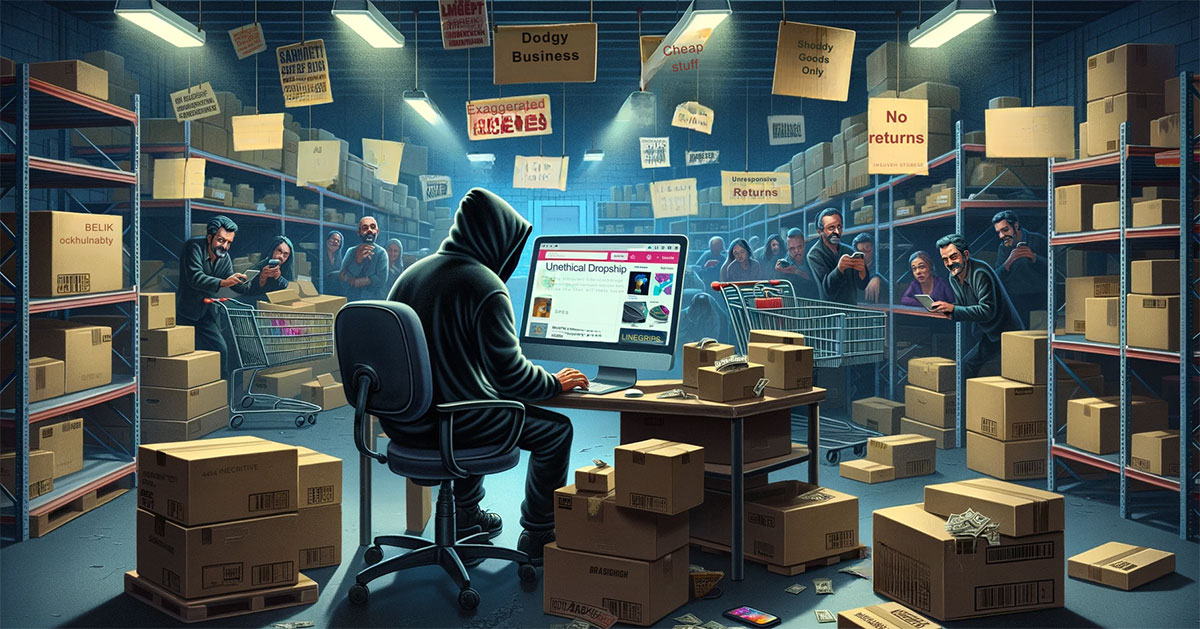Is Dropshipping Unethical: Debunking the Moral Controversy

Is Dropshipping Unethical?
In today’s fast-paced digital economy, dropshipping has emerged as a popular business model, revolutionizing the way e-commerce operates. However, this innovative approach has sparked ethical debates, with concerns raised about its impact on suppliers, manufacturers, and consumers. In this comprehensive guide, we will delve deep into the moral implications of dropshipping, examining its environmental and social effects, legal grey areas, and the importance of transparency and ethical practices in the supply chain.
Dropshipping: Understanding the Business Model
Dropshipping involves a unique retail fulfillment method where the seller doesn’t keep the products in stock. Instead, when a product is sold, the seller purchases the item from a third party and has it shipped directly to the customer.
This eliminates the need for inventory storage and streamlines the logistics process. As a result, entrepreneurs are drawn to this model due to its low initial investment and reduced operational complexities. Dropshipping has significantly lowered the barrier to entry for aspiring e-commerce entrepreneurs, leading to a proliferation of online stores and marketplaces.
Despite its widespread adoption, the rise of dropshipping has triggered ethical concerns within the e-commerce landscape. Critics argue that the model raises questions about fair business practices, consumer deception, and the well-being of suppliers and manufacturers. To better understand these concerns, it’s essential to explore the ethical dimensions of e-commerce and retail.
Examining Ethical Concerns in E-commerce and Retail
E-commerce and retail have long been under scrutiny for ethical practices, with issues such as counterfeit products, deceptive advertising, and unfair competition plaguing the industry. When applied to dropshipping, these concerns are amplified, as the lack of direct control over inventory and fulfillment can lead to potential ethical pitfalls. From a consumer standpoint, the lack of transparency about the origin of products and extended shipping times can raise questions about the integrity of the business and the authenticity of the goods.
Furthermore, the competitive landscape of dropshipping can lead to price wars and undercutting, potentially harming both consumers and legitimate businesses. This raises a fundamental ethical question: does the pursuit of profit through dropshipping justify potential negative repercussions for suppliers, manufacturers, and consumers?
The Impact of Dropshipping on Suppliers and Manufacturers
One of the primary ethical concerns surrounding dropshipping revolves around its impact on suppliers and manufacturers. As dropshipping relies on third-party suppliers to fulfill orders, there is a risk of imposing undue pressure on these entities. The quest for lower prices and faster shipping times may lead to strained relationships, quality control issues, and even exploitation of labor in some cases. This raises questions about the ethical responsibility of dropshippers in ensuring fair and equitable partnerships with their suppliers.
Strained Relationships and Quality Control
Dropshipping often involves a multitude of suppliers, each responsible for different products within a seller’s inventory. This decentralized approach can strain the relationships between the dropshipper and the suppliers, potentially impacting the quality and consistency of the products being offered. Ethical dropshipping practices should prioritize maintaining open and respectful communication with suppliers to uphold product quality and ethical production standards.
Labor Exploitation and Fair Trade Practices
In the global marketplace, dropshippers have a responsibility to ensure that their suppliers adhere to fair labor practices and ethical manufacturing standards. This includes verifying that workers are treated fairly, paid equitably, and operate in safe working conditions. By fostering ethical supply chain relationships, dropshippers can play a crucial role in promoting fair trade practices and social responsibility within the industry.
Consumer Perspective: Is Dropshipping Deceptive?
From a consumer perspective, the ethical implications of dropshipping are closely tied to transparency and trust. When consumers make a purchase, they expect honesty regarding the origin of the product, its quality, and the shipping process.

In the context of dropshipping, the lack of upfront information about the sourcing and fulfillment methods can lead to perceptions of deception and erode consumer confidence.
Transparency and Trust
Ethical dropshippers prioritize transparency by clearly communicating their business model and the sourcing of their products. This transparency builds trust with consumers and fosters a sense of authenticity.
By openly addressing the dropshipping model and setting realistic expectations for shipping times, ethical dropshippers can mitigate concerns about deception and ensure a positive consumer experience.
Quality Assurance and Customer Satisfaction
Ensuring product quality and customer satisfaction is paramount in ethical dropshipping. By conducting thorough quality checks, providing accurate product descriptions, and offering responsive customer support, dropshippers can uphold ethical standards and deliver a positive shopping experience. Ethical dropshippers prioritize customer satisfaction and work closely with suppliers to maintain high product standards.
Analyzing Environmental and Social Implications of Dropshipping
Beyond its impact on suppliers and consumers, dropshipping also raises environmental and social considerations that warrant ethical scrutiny. The decentralized nature of dropshipping can lead to increased carbon emissions from multiple shipments and packaging, contributing to environmental concerns.
Additionally, the potential for excessive returns and product waste may further exacerbate the environmental impact of dropshipping.
Sustainable Packaging and Carbon Footprint Reduction
Ethical dropshippers are mindful of the environmental footprint of their business operations. They seek to minimize packaging waste, implement eco-friendly packaging materials, and explore carbon-neutral shipping options. By prioritizing sustainable practices, ethical dropshippers mitigate the environmental impact of dropshipping and align with evolving consumer preferences for eco-conscious businesses.
Community Engagement and Social Responsibility
Ethical dropshippers recognize the importance of giving back to the community and supporting social causes. By engaging in philanthropic initiatives, fostering ethical partnerships with local suppliers, and promoting fair labor practices, dropshippers can positively impact the communities involved in their supply chain. This commitment to social responsibility reflects ethical business conduct and contributes to a more sustainable and equitable e-commerce ecosystem.
Navigating Legal Grey Areas in Dropshipping Practices
The dynamic nature of e-commerce and dropshipping introduces legal complexities that require careful navigation to ensure ethical compliance. From intellectual property rights and product liability to international trade regulations, dropshippers must navigate a myriad of legal considerations to operate ethically and responsibly.

Intellectual Property Rights and Brand Integrity
Ethical dropshippers prioritize respect for intellectual property rights and the integrity of brands. By avoiding the sale of counterfeit or unauthorized products, they uphold ethical standards and contribute to a fair and lawful marketplace. Furthermore, ethical dropshippers proactively engage in due diligence to ensure that the products they offer adhere to legal and trademark requirements.
Product Liability and Consumer Protection
The ethical obligations of dropshippers extend to ensuring product safety and consumer protection. By collaborating with reputable suppliers and adhering to product safety regulations, ethical dropshippers prioritize the well-being of their customers. They proactively address product liability concerns and maintain transparency regarding product origins and safety certifications, fostering a culture of ethical responsibility within the industry.
Debunking Myths: Separating Ethical from Unethical Practices
In the conversations surrounding dropshipping, numerous myths and misconceptions have emerged, blurring the line between ethical and unethical practices. It’s imperative to dispel these myths and clarify the ethical considerations that underpin responsible dropshipping operations.
Myth: Dropshipping is Inherently Unethical
Contrary to popular belief, dropshipping itself is not inherently unethical. The ethical implications arise from how the business model is implemented and the practices adopted by individual dropshippers. By embracing ethical sourcing, transparent communication, and sustainable operations, dropshippers can uphold ethical standards and contribute positively to the e-commerce ecosystem.
Myth: Dropshipping is Always Deceptive to Consumers
While deceptive practices exist within some dropshipping operations, ethical dropshippers prioritize transparency and honesty. By providing accurate product information, clearly disclosing shipping times, and offering responsive customer support, ethical dropshippers build trust and credibility with consumers.
Transparency and Honesty in the Dropshipping Supply Chain
Transparency and honesty are foundational pillars of ethical dropshipping, essential for fostering trust and integrity within the supply chain. By maintaining open communication with suppliers, disclosing the dropshipping model to consumers, and upholding ethical sourcing practices, dropshippers can cultivate a transparent and honest business environment.
Supplier Communication and Partnership Transparency
Ethical dropshippers prioritize collaborative and transparent relationships with their suppliers. Effective communication, fair negotiations, and mutual respect form the cornerstone of ethical supply chain management. By keeping suppliers informed about business operations and maintaining transparency in all dealings, ethical dropshippers foster long-term partnerships based on trust and integrity.
Consumer Education and Disclosure
Ethical dropshippers are committed to educating consumers about the dropshipping model and its implications. By clearly disclosing the sourcing and fulfillment methods, as well as providing realistic shipping expectations, ethical dropshippers empower consumers to make informed purchasing decisions. This transparent approach builds consumer confidence and promotes ethical business conduct.
Ethics Beyond Profit: Creating a Sustainable E-commerce Strategy
Ultimately, the ethical considerations surrounding dropshipping extend beyond profit and market competitiveness. Ethical dropshippers embrace a holistic approach that prioritizes sustainability, social responsibility, and consumer welfare, thereby shaping a more ethical and sustainable e-commerce landscape.
Sustainability and Ethical Supply Chain Management
Ethical dropshippers integrate sustainability into their supply chain management practices, emphasizing eco-friendly packaging, carbon footprint reduction, and ethical sourcing. By aligning with sustainable initiatives, they contribute to the global movement towards environmentally conscious business operations.
Social Responsibility and Community Impact
In addition to sustainable practices, ethical dropshippers actively engage in social responsibility initiatives that positively impact the communities involved in their supply chain. By supporting local artisans, promoting fair labor practices, and contributing to social causes, they foster a culture of ethical and responsible business conduct.
In conclusion, the ethical dimensions of dropshipping are multifaceted and require a nuanced approach to navigate. By embracing transparency, ethical sourcing, sustainable practices, and social responsibility, dropshippers can debunk the myth of dropshipping as inherently unethical and contribute to a more ethical and sustainable e-commerce ecosystem.
By understanding and addressing the ethical concerns surrounding dropshipping, businesses can cultivate trust with consumers, build resilient partnerships with suppliers, and contribute to a more ethical and sustainable e-commerce landscape. As the digital economy continues to evolve, ethical considerations will play an increasingly pivotal role in shaping the future of e-commerce and retail.
Through a commitment to ethical conduct, dropshippers can not only achieve business success but also contribute to a more ethical and sustainable e-commerce ecosystem, thereby reshaping the narrative around the moral controversy of dropshipping.






